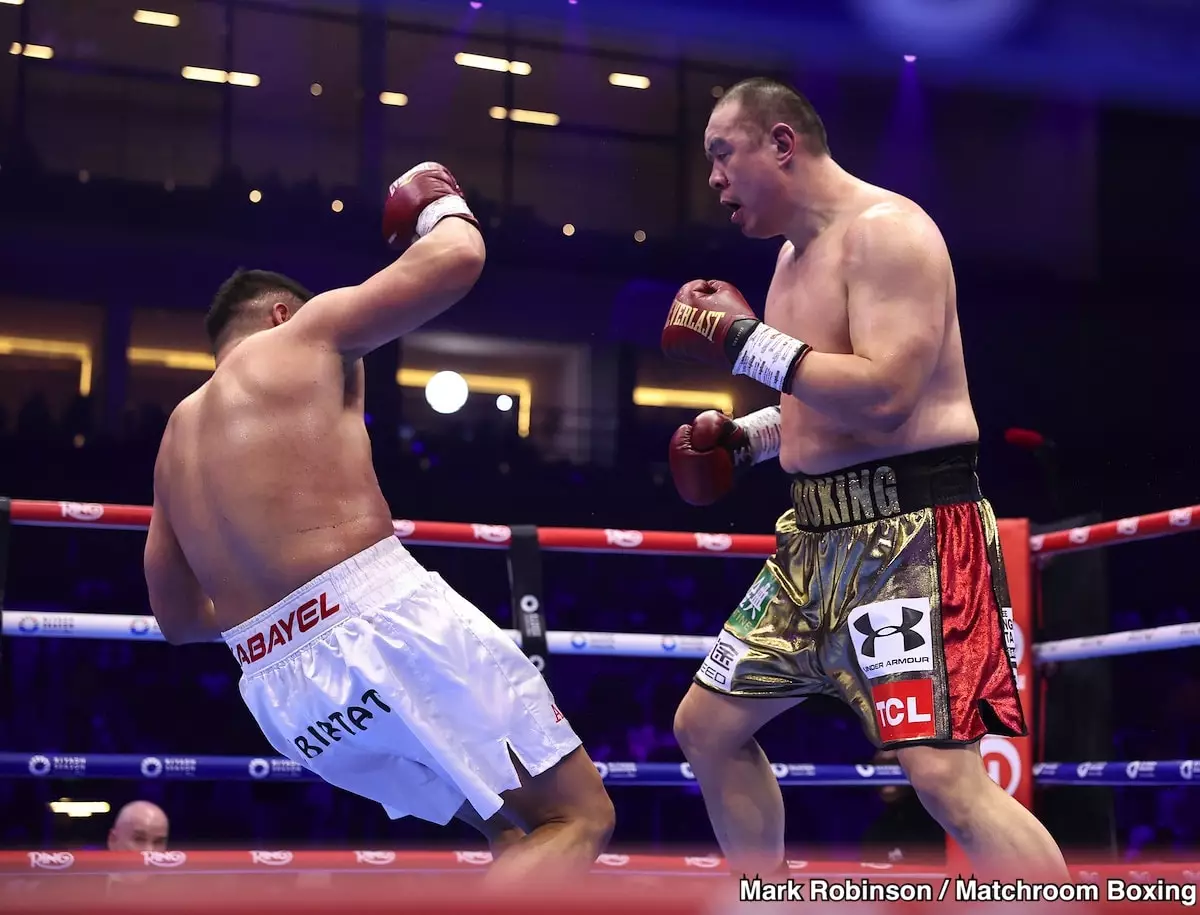Zhilei Zhang, the towering figure in heavyweight boxing, recently found himself at a crossroads. Having come off an agonizing defeat at the hands of Agit Kabayel, where he struggled for breath in the ring and faced a sixth-round stoppage, many may have scratched him off as a contender. However, Zhang’s spirit offers a testament to resilience, embodying the essence of a true fighter. At 42 years old, he stands surrounded by skepticism and doubt, but his declaration that “age is just a number” reflects a steadfast determination to rewrite his narrative.
This isn’t just a comeback; it’s an audacious proclamation against the odds. Zhang’s story, marred by a brutal end to a recent bout, forces us to reckon with the reality of an aging athlete in a sport traditionally dominated by youth. As he shared his emotional recollection of the fight on his YouTube channel, he didn’t shy away from the harsh truths of his experience. The weight of the defeat, the physical toll, and the ebbing confidence that follows a setback are tangible for Zhang, yet he chooses to frame them as steps towards rebounding rather than insurmountable obstacles.
Strategizing A Return to Glory
Though the psychological scars of recent performances linger, Zhang’s ability to self-analyze his losses is vital for his growth. He recognized the body shots that disrupted his tactical approach and the rhythm that he struggled to maintain throughout the fight. More than merely focusing on his physical condition, these revelations highlight a fighter learning from adversity—an essential quality in athletics. But the lingering question remains: can he adapt effectively to the scrutiny that surrounds him?
Zhang’s confession about being troubled by Kabayel’s relentless output underscores the challenge he faces as he enters this new chapter. With a professional record of 27 wins and only 3 losses, against names like Filip Hrgovic, Joseph Parker, and Kabayel himself, Zhang’s power is undeniable. What lies ahead is a daunting challenge where he must outsmart opponents who are now privy to his vulnerabilities. The reality of heavyweight boxing is harsh—every opponent studies past fights, searching for weaknesses, and it might very well be his body that features at the forefront of their strategy.
The Power of Perspective
While Zhang’s resolve is commendable, the road to success at this stage in his career may not be paved with easy victories. Transitioning from high-stakes bouts against elite fighters to reclaiming a position among them requires not only significant physical preparation but also strategic finesse. The diversity of potential adversaries he faces presents both opportunity and threat; rising competitors are hungry for glory and seasoned champions are unyielding.
Interestingly, one of the appealing matchups that fans eagerly anticipate is a showdown between Zhilei Zhang and Anthony Joshua. This potential clash could draw significant attention—both for its tactical nature and for the sheer size and power that the fighters possess. Such a match-up not only serves to re-ignite interest in Zhang’s career but also illustrates the duality of challenge and opportunity: beating a high-profile name like Joshua could elevate Zhang back to the forefront of heavyweight boxing.
The Weight of Experience and Lessons Learned
The greatest asset that a seasoned fighter possesses is experience; every punch thrown and every round fought becomes a lesson etched into their being. Zhang’s acknowledgment of his previous mistakes speaks to this reality, suggesting that he is not merely riding the waves of his past but actively seeking to learn from them. Importantly, by assessing what went wrong during his most recent bouts, Zhang is doing more than simply preparing physically; he is recalibrating his entire approach to the sport.
This introspection can usher in a newfound belief and innovation in strategy. “I still have not lowered my fist,” he states, reinforcing his unyielding spirit. As he trains, full of fire and intention, Zhang remains a figure to watch—truly embodying the undeterred nature of a fighter. His journey toward restoration is not just a personal battle; it’s a narrative intertwined with the essence of the sport: that boxing is as much a mental endeavor as it is a physical one. Navigating the complexities of his career at an age where many have hung up their gloves offers invaluable lessons not only for himself but also for the next generation of fighters.

